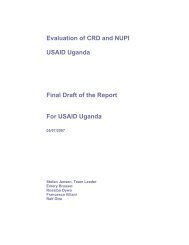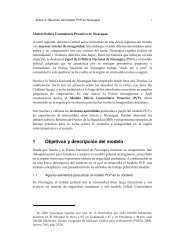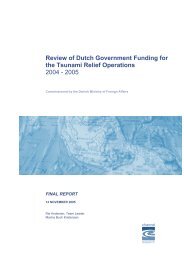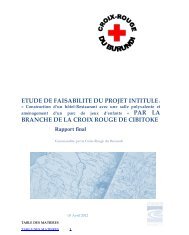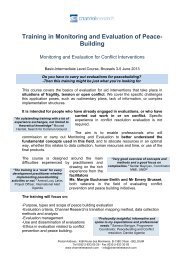A ripple in development? - Channel Research
A ripple in development? - Channel Research
A ripple in development? - Channel Research
You also want an ePaper? Increase the reach of your titles
YUMPU automatically turns print PDFs into web optimized ePapers that Google loves.
example <strong>in</strong> health or women’s livelihoods. It is widely agreed <strong>in</strong> aid<br />
practice that such <strong>in</strong>tegration achieves better results, and that women,<br />
which have been identified <strong>in</strong> many programmes, play a key role.<br />
Taken <strong>in</strong> a wider context, <strong>in</strong> Sri Lanka trauma and fear were<br />
ranked fourth <strong>in</strong> importance, out of n<strong>in</strong>e issues <strong>in</strong> 2005 (after loss of<br />
property, livelihoods and day-to-day life), whereas today it is ranked fifth<br />
out of n<strong>in</strong>e (after loss of property, livelihoods, day-to-day life and local<br />
<strong>in</strong>frastructure). In Indonesia trauma and fear ranked seventh most<br />
important out of eight issues immediately after the tsunami, bottom of<br />
the list at the end of 2005 and fifth out of n<strong>in</strong>e issues <strong>in</strong> 2008, with the<br />
same issues considered as more important as those reported by the Sri<br />
Lankans.<br />
The <strong>in</strong>crease <strong>in</strong> women’s participation <strong>in</strong> societal decision-mak<strong>in</strong>g<br />
and <strong>in</strong>volvement <strong>in</strong> recovery activities is another factor of success. In Sri<br />
Lanka, only 21% of survey respondents considered that the status of<br />
women <strong>in</strong> society is better today than before the tsunami with 43%<br />
believ<strong>in</strong>g there is no change. In Indonesia, 32% say it is better today<br />
than before the tsunami whereas 36% believe there is no change.<br />
National and <strong>in</strong>ternational NGOs alike have succeeded <strong>in</strong> facilitat<strong>in</strong>g<br />
and encourag<strong>in</strong>g women to establish and run their own group.<br />
Interventions that do not take these dimensions <strong>in</strong>to account would<br />
<strong>in</strong>evitably face difficulties when attempt<strong>in</strong>g community mobilisation.<br />
Over time, there has been an <strong>in</strong>crease <strong>in</strong> the number of organisations<br />
which have taken this approach.<br />
4.3 Effect of local <strong>in</strong>itiative on functional communities<br />
The primary importance of attitudes to change is also affected by the<br />
material dimensions of recovery. In areas where vital <strong>in</strong>frastructure,<br />
such as access to electricity, water and sewerage systems, roads, schools<br />
and health services, has not been assured, social relations often rema<strong>in</strong><br />
dysfunctional. This is due to people be<strong>in</strong>g deterred from lead<strong>in</strong>g lives<br />
accord<strong>in</strong>g to their own expectations, as well as loss of former livelihoods.<br />
Waste management programmes <strong>in</strong> the Maldives for example have<br />
not had the desired effect of provid<strong>in</strong>g communities with safe and susta<strong>in</strong>able<br />
waste disposal facilities. The Canadian Red Cross Society and<br />
UNDP built waste management centres on several affected islands, but<br />
these stand empty and locked, because there is no possibility of dispos<strong>in</strong>g<br />
of the waste beyond pil<strong>in</strong>g it up. Sensibly, communities have chosen<br />
to cont<strong>in</strong>ue with their traditional methods of burn<strong>in</strong>g, bury<strong>in</strong>g or dropp<strong>in</strong>g<br />
waste at sea rather than hav<strong>in</strong>g it be a nuisance and, quite possibly,<br />
public health hazard (a compla<strong>in</strong>t voiced <strong>in</strong> Gaafu Alifu), <strong>in</strong> the newly<br />
provided spaces. To assume that waste becomes government responsibility<br />
once it has been gathered <strong>in</strong> the waste centres is an example of<br />
<strong>in</strong>efficient l<strong>in</strong>kage: if governments had not found a way to safely dispose<br />
76




